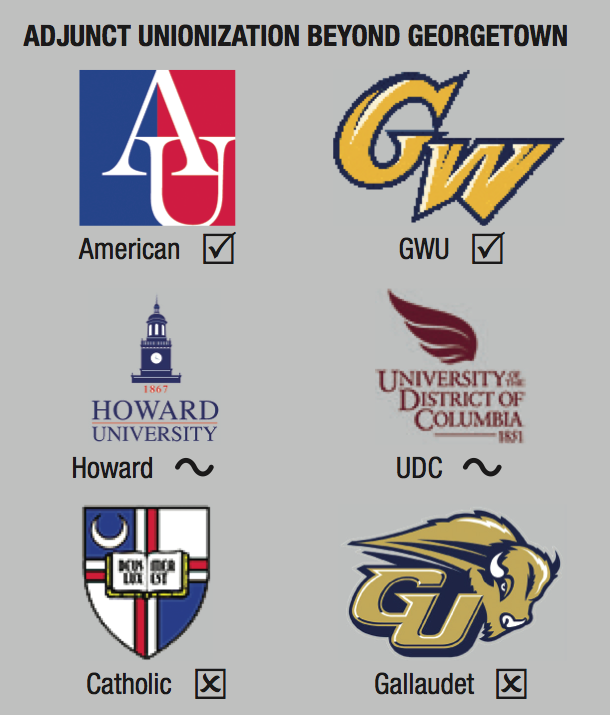 In the wake of adjunct unionization at The George Washington University in 2006, American University in 2010, and Georgetown University in 2012, union organizers with the Service Employees International Union are working toward the creation of a District-wide contract for unionized adjuncts that would be the first of its kind.
In the wake of adjunct unionization at The George Washington University in 2006, American University in 2010, and Georgetown University in 2012, union organizers with the Service Employees International Union are working toward the creation of a District-wide contract for unionized adjuncts that would be the first of its kind.
“There’s no city in America, no city in the world … that has had this approach toward their part-time faculty. To be blunt, we are pioneers,” adjunct professor of music at GWU and Vice President for Higher Education at SEIU Kip Lornell said.
Based in Maryland and Washington, D.C., SEIU represents over 2,400 adjunct faculty at area universities.
“It is a vision that we are beginning to implement, or a vision that we are beginning to strategize how to implement,” SEIU Director of Research and Strategic Planning Anne McLeer said.
With 70 percent of D.C.’s adjuncts already unionized with SEIU, and Howard University and the University of the District of Columbia in the process of unionization, Lornell was optimistic about the contract’s chances.
“I really think there’s a sense of inevitability, and the trend is very clear, that this is going to happen,” Lornell said.
Under a city-wide contract, adjuncts who teach at multiple universities within the city-wide union would be able to receive benefits from funds pooled by all of the institutions.
“For example, it may be that if you teach at three places, each school can put in some money for a retirement fund. It could be that the universities pool some of their money instead of Georgetown, GWU, AU putting some money into retirement, they put it into a pool, and you’d be employed under this contract and you could work and have benefits,” Lornell said.
The idea of a city-wide union is not a new one. The Justice for Janitors union, also part of the SEIU, serves as a similar model for such a contract that allows employees to work for multiple employers within the same industry.
“Those workers are similarly situated in a way to the adjunct who sort of pieces together full-time work from a number of part-time positions with different employers, yet get benefits from none of those employers,” McLeer said.
Adjuncts from all over the country met to discuss the possibility of a city-wide contract, as well as the future of unionization of D.C., for the second time last Monday at Georgetown. Georgetown’s adjunct professors unionized in May 2013 following an overwhelming vote in favor of unionization.
Along with the potential behind a city-wide contract, the adjuncts also discussed the challenges adjuncts face in terms of lack of benefits and job security, as well as obstacles to the unionization movement posed by university administration and the debate over the instructional quality of adjuncts compared to full-time professors.
“The reality is that adjuncts have Ph.D.s, the same qualifications as other professors, so it’s a matter of framing the debate about the institutional exploitation and low pay that they’re providing for people that do the same work,” Georgetown adjunct professor of theology Kerry Danner-McDonald said.
The irregular working hours of adjunct faculty can also pose problems for unionization since the schedule can prevent adjunct faculty from connecting with one another, McLeer said.
“The word ‘union’ means community and a collective people. It’s a challenge to create a union and create a sustained union, when there’s no preexisting community or very little preexisting community,” McLeer said.
Lornell also addressed the administrative blocks and backlash adjuncts receive when they inform their institutions that they are trying to unionize.
“Administration will say something like, ‘You don’t want this obtrusive union to interfere with your ability to negotiate with us directly. We think it’s a bad idea.’ Pretty much if I sat down, I could compose almost exactly the same kind of several paragraph press release that any university approached to unionize part-time faculty would send out,” Lornell said.
Danner-McDonald noted the hypocrisy of university administration’s reluctance to allow their adjuncts to unionize.
“I think the really critical issue is there’s this kind of hypocrisy within the institutions themselves. The institution is saying that critical thinking, higher education, is an important value in, not only the personal growth, but the professional development of a student, but then not in turn valuing those people who have hit the highest level of achievement in their discipline by earning these advanced degrees and being committed to teaching. So that’s, I think, the key issue, is holding the institutions accountable for the values they say they proclaim,” Danner-McDonald said.
Lornell, however, praised the Georgetown’s administration’s cooperation with its adjunct union.
“Best I can tell from being there myself and from talking to part-time faculty at Georgetown and other organizers, the Georgetown administration was objective, hands off and stayed out of this whole issue entirely,” Lornell said.
Lornell predicted that adjuncts could see the enactment of a city-wide contract within the next several years.
“I think that this may well be the last individual contract that we negotiate with GWU,” Lornell said of the renegotiation of GWU’s unionization contract this July.
Adjuncts will meet to discuss the future of unionization for a third time at the end of April.














